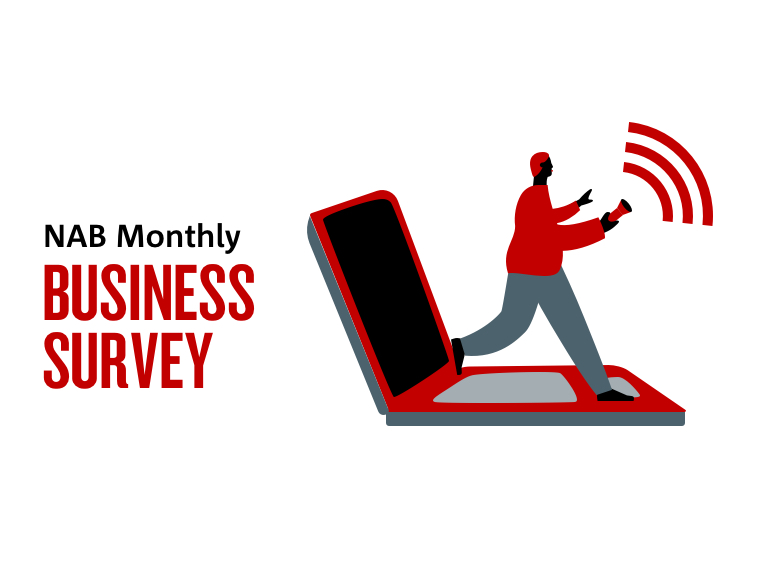Firmer consumer and steady outlook


Insight
Conditions surge higher as costs, prices hit records.

Our podcast series to accompany the NAB Monthly Business Survey continues, giving you a 10 minute summary of the key survey developments this month. Listen now.
If listening on a mobile device, click listen in browser.
Business conditions surged higher in March and confidence also strengthened. Trading conditions and profitability rose markedly, suggesting demand remains strong, and employment also rose. The improvement was largely driven by the retail sector, which saw conditions rise 23pts, as well as recreation & personal services and finance, business & property. Confidence jumped in the transport, construction, and recreation & personal services sectors, and leading indicators also strengthened overall with capacity utilisation up to 83.1%. Across the states, WA saw a significant boost to conditions as the border fully reopened and conditions and confidence are now fairly strong across all jurisdictions. Overall, both conditions and confidence are now back around the levels last seen in the pre-Delta rebound, despite activity having more than recovered its pre-Covid level. Cost growth escalated further in the month, with labour cost growth hitting 2.7% in quarterly terms and purchase cost growth up to 4.2% – both tracking at considerably higher rates than at any other point in the history of the survey. However, firms seem to have been able to pass on at least some cost pressure with prices also rising at their fastest rate in the history of the survey at 2.3%. The escalation in price growth included prices in retail sector, which rose 3.7% in quarterly terms, likely supporting margins and helping to explain the very strong increase in the profitability index for the sector. The continued escalation in price growth over recent months suggests a strong Q1 CPI reading is likely when released later in the month and based on the monthly trend could well continue to build in Q2.
Business conditions rose 9pts in March to +18 index points, the largest one-month jump since June 2020. Trading conditions and profitability strengthened sharply, with trading conditions up 13pts to +24 index points and profitability up 8pts to +13 index points, and employment also improved.
“A surge in business conditions headlined a really strong March survey,” said NAB Group Chief Economist Alan Oster. “Businesses reported very strong trading conditions and a sharp rise in profitability, which indicates demand is continuing to hold up as the economy rebounds from Omicron and growth gathers momentum.”
“The retail sector drove much of the improvement in conditions, and there were also large gains in finance, business & property and in recreation & personal services,” said Mr Oster. “That indicates household consumption continues to grow strongly with consumers undeterred by rising inflation, at least so far.”
“In terms of the states, the strongest outcome was in Western Australia where it appears the end of COVID-related border restrictions has helped to really boost conditions,” said Mr Oster. “However, conditions were up in every state with a strong improvement in Victoria as well as South Australia and Tasmania.”
Business confidence rose 3pts in March to +16 index points, continuing the steady rise since the onset of the Omicron outbreak in December. Forward orders continued to strengthen, up 3pts to +12 index points, while capacity utilisation also edged higher to 83.1%.
“Business confidence continued to improve in March, with little evidence of any adverse impact from events in Ukraine,” said Mr Oster. “The outlook also strengthened in terms of forward orders which points to ongoing economic growth over coming months.”
Cost and price growth measures in the survey rose to record levels in the month. Purchase cost growth reached 4.2% in quarterly terms, while labour cost growth hit 2.7%. Price growth also rose to 2.3%, with retail price growth rising to 3.7%.
“Costs are growing at record rates in the history of the survey,” said Mr Oster. “Purchase costs reached records with elevated oil prices adding to existing supply chain issues, and labour costs are also rising as businesses hire more workers in a very competitive labour market. These cost pressures are very broad-based across industries.”
“Importantly, it appears businesses have had little trouble passing on higher costs to consumers with prices – including retail prices – also rising at record rates,” said Mr Oster. “Survey price measures differ from official measures in important ways, but we nonetheless expect very strong inflation in Q1 and likely Q2,” said Mr Oster.
“Overall, the results depict a very strong rebound, led by strong consumer demand,” said Mr Oster.
For more information, please see the NAB Monthly Business Survey (March 2022)
© National Australia Bank Limited. ABN 12 004 044 937 AFSL and Australian Credit Licence 230686.